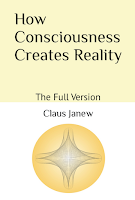Could it be that our consciousness is not simply a product of the brain, but
the result of an all-encompassing alternation between individuals and the
universe? In this innovative book, Claus Janew proposes the groundbreaking
idea of the "i-structure" or "infinitesimality structure", a concept that
elegantly combines four seemingly disparate perspectives to explain the
fundamental nature of consciousness and reality.
In a riveting dialogue, Janew explores how the continuous interplay of
collective and individual awareness, the infinite and the infinitesimal, the
determinacy and indeterminacy of free will, gives rise to our experience of a
stable and yet endlessly creative world. With remarkable clarity and insight,
he tackles age-old philosophical problems such as the existence of free will,
the subjectivity of consciousness, and the relationship between self and
other.
"Alternating Consciousness" is an incredible journey that takes the reader
from the basics of the i-structure to its far-reaching implications for our
understanding of reality. Janew's pioneering vision not only bridges the gap
between science and spirituality but also offers a fresh perspective on the
nature of our existence.
Great Read. Thank you for putting your work out into a conscious space
for all. Much appreciated.
Marcel P. Londt, PhD, South Africa
Read online (90%)
Order the Book
Order the Book
Also in this book:
The Reality of Free Will
The uniqueness of each standpoint, each point of effect, can only be
"overcome" by the standpoint changing to other standpoints and returning. In
such alternation, which can also appear as constant change, lies the unity
of the world. The wholeness of an alternation, however, is a structure of
consciousness due to the special relationship between the circumscribing
periphery and the infinitesimal center. This process structure unites
determinacy and indeterminacy also totally in every place. Therefore,
everywhere we are dealing with forms of consciousness with more or less
freedom of choice and an increasingly unknown depth. We live in a world of
choosing consciousness, or rather awareness. In this respect, our
environment expresses a deep truth about ourselves.
I am impressed by the comprehensiveness of your interdisciplinary
approach. There are some major philosophical concepts which you weave
very well into a necessary system of reality: potential, the one and the
many, alternation, constant change, the reality and uniqueness of
oneiric experience and the whole, interdependence, infinity, the mandate
of opposites and many more. The combination of these ideas cannot be
attributed solely to any other of the established classical and modern
thinkers of whom I am aware. I thank you for your enlightenment.
E W Ralph, UK





